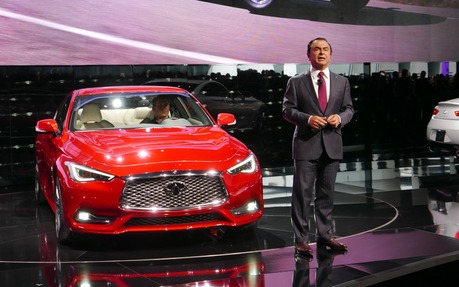Carlos Ghosn: Don't Worry, We'll Keep Building Efficient Cars
Carlos Ghosn: Low Fuel Prices Won't Nudge Automakers Away From Efficient Cars
The accepted wisdom is that low fuel prices push consumers to shop for less efficient automobiles - but do the same market forces divert car companies from investing in eco-friendly technologies in favor of cheaper-to-develop, but thirstier drivetrains? This was the question posed to Carlos Ghosn, CEO of Renault-Nissan Alliance, one of the largest automakers in the world, at the 2016 North American International Auto Show in Detroit, Michigan.
Speaking to a small panel of journalists, Ghosn was careful to explain the difference between consumer habits and the product planning that goes on behind the scenes at a major car company. While he acknowledged that yes, the cheaper the price at the pump, the less likely people are to purchase a vehicle that prioritizes efficiency, he went on to explain that automakers are far more influenced by international regulations and governments with regards to fuel consumption, and most importantly emissions.
Environmental regulators don't tie their policy to the cost of gasoline - instead, they set emissions and efficiency targets based on specific timelines that are decoupled from market forces. Even if a car company wanted to build a less frugal car, it's simply not possible, because market access requires adherence to increasingly tight governmental standards.
According to Ghosn, those concerned with the rock bottom cost of oil need not worry that car companies around the world will reverse their progress towards ever more efficient designs. Global regulations - in particular those aimed at limiting CO2 emissions - have locked automotive development along a path that requires significant dollars be spent on keeping tailpipes as clean as possible, and engines as efficient as they can be.
Ghosn also pointed out that Nissan intends to continue what it considers to be its leadership position in affordable battery-powered automobiles by introducing a second-generation Nissan Leaf electric car in the near future. Nissan's CEO said that he believes the primary reason few people purchase EVs isn't range anxiety, but rather a lack of charging infrastructure, particularly fast charging solutions that could rival existing gasoline fueling stations in terms of rapidity. When pressed as to whether the Renault-Nissan Alliance would expand its 'leadership' in electric vehicles to include the funding of a cross-continental charging system, Ghosn demurred, saying that the issue required partnership between not just private corporations but also local and national governments.
